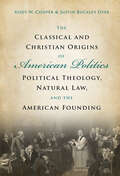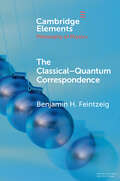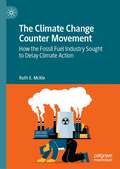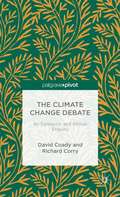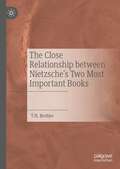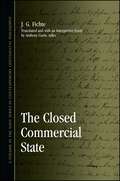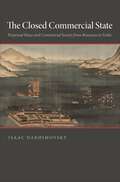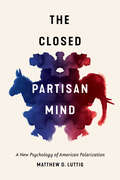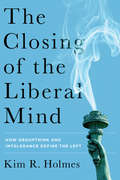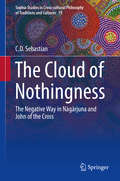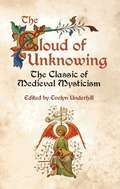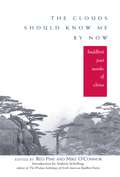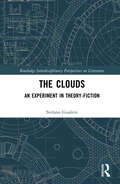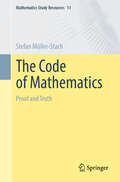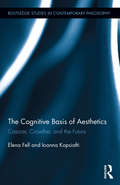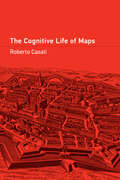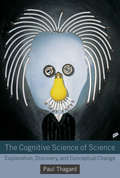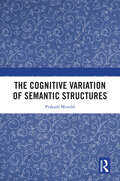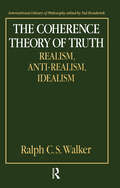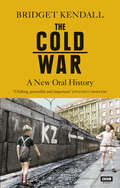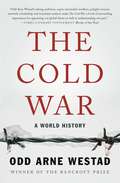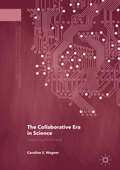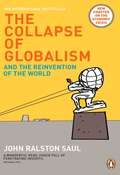- Table View
- List View
The Classical and Christian Origins of American Politics: Political Theology, Natural Law, and the American Founding
by Justin Buckley Dyer Kody W. CooperThere has been a considerable amount of literature in the last 70 years claiming that the American founders were steeped in modern thought. This study runs counter to that tradition, arguing that the founders of America were deeply indebted to the classical Christian natural-law tradition for their fundamental theological, moral, and political outlook. Evidence for this thesis is found in case studies of such leading American founders as Thomas Jefferson and James Wilson, the pamphlet debates, the founders' invocation of providence during the revolution, and their understanding of popular sovereignty. The authors go on to reflect on how the founders' political thought contained within it the resources that undermined, in principle, the institution of slavery, and explores the relevance of the founders' political theology for contemporary politics. This timely, important book makes a significant contribution to the scholarly debate over whether the American founding is compatible with traditional Christianity.
The Classical–Quantum Correspondence (Elements in the Philosophy of Physics)
by Benjamin H. FeintzeigThis Element provides an entry point for philosophical engagement with quantization and the classical limit. It introduces the mathematical tools of C*-algebras as they are used to compare classical and quantum physics. It then employs those tools to investigate philosophical issues surrounding theory change in physics. It discusses examples in which quantization bears on the topics of reduction, structural continuity, analogical reasoning, and theory construction. In doing so, it demonstrates that the precise mathematical tools of algebraic quantum theory can aid philosophers of science and philosophers of physics.
The Climate Change Counter Movement: How the Fossil Fuel Industry Sought to Delay Climate Action
by Ruth E. McKieThis book provides an historical account of the emergence and spread of the climate change counter movement across the globe. Drawing on an extensive database developed by the author, the book recounts the development of an international network, taking the reader on a journey through the history of the movement before looking closely at a series of comparative case studies examining movement organisations in different countries.
The Climate Change Debate: An Epistemic and Ethical Enquiry
by David Coady Richard CorryOf the two kinds of philosophical questions - epistemic and ethical - raised by the public debate about climate change, professional philosophers have dealt almost exclusively with the ethical. This book is the first to address both and examine the relationship between them.
The Close Relationship between Nietzsche's Two Most Important Books
by T. H. BrobjerThis book studies the close relationship between Thus Spoke Zarathustra and the unfinished four volume Revaluation of All Values that he worked on until shortly before his collapse. It is unlikely that he would have returned to and continued Thus Spoke Zarathustra, but he considered publishing the fourth part (which had not yet been published) as a bridge between Zarathustra and the unfinished Revaluation of All Values. More importantly, during his last years he worked hard on revaluing values, often in line with what he had written in Thus Spoke Zarathustra. This present study performs detailed analyses of Nietzsche’s texts and late notes to examine the direction of that unfinished work; it will function as a stimulus to further research on the direction, interpretation and consequences of Nietzsche’s late thought.
The Closed Commercial State (SUNY series in Contemporary Continental Philosophy)
by J. G. FichteAppearing for the first time in a complete English translation, The Closed Commercial State represents the most sustained attempt of J. G. Fichte, the famed author of The Doctrine of Science, to apply idealistic philosophy to political economy. In the accompanying interpretive essay, Anthony Curtis Adler challenges the conventional scholarly view of The Closed Commercial State as a curious footnote to Fichte's thought. The Closed Commercial State, which Fichte himself regarded as his "best, most thought-through work," not only attests to a life-long interest in economics, but is of critical importance to his entire philosophical project. Carefully unpacking the philosophical nuances of Fichte's argument and its complex relationship to other texts in his oeuvre, Adler argues that The Closed Commercial State presents an understanding of the nature of history, and the relation of history to politics, that differs significantly from the teleological notions of history advanced by Schelling and later Hegel. This critical scholarly edition includes a German-English glossary, annotations, and page references to both major German editions.
The Closed Commercial State: Perpetual Peace and Commercial Society from Rousseau to Fichte
by Isaac NakhimovskyThis book presents an important new account of Johann Gottlieb Fichte's Closed Commercial State, a major early nineteenth-century development of Rousseau and Kant's political thought. Isaac Nakhimovsky shows how Fichte reformulated Rousseau's constitutional politics and radicalized the economic implications of Kant's social contract theory with his defense of the right to work. Nakhimovsky argues that Fichte's sequel to Rousseau and Kant's writings on perpetual peace represents a pivotal moment in the intellectual history of the pacification of the West. Fichte claimed that Europe could not transform itself into a peaceful federation of constitutional republics unless economic life could be disentangled from the competitive dynamics of relations between states, and he asserted that this disentanglement required transitioning to a planned and largely self-sufficient national economy, made possible by a radical monetary policy. Fichte's ideas have resurfaced with nearly every crisis of globalization from the Napoleonic wars to the present, and his book remains a uniquely systematic and complete discussion of what John Maynard Keynes later termed "national self-sufficiency." Fichte's provocative contribution to the social contract tradition reminds us, Nakhimovsky concludes, that the combination of a liberal theory of the state with an open economy and international system is a much more contingent and precarious outcome than many recent theorists have tended to assume.
The Closed Partisan Mind: A New Psychology of American Polarization
by Matthew D. LuttigThe Closed Partisan Mind traces the roots of partisan polarization to psychological closed-mindedness in the electorate and the changing perception of politics created by polarized political leaders and the new media environment. American politics today can be defined by the intense and increasingly toxic divide between Democrats and Republicans. Matthew D. Luttig explores why so many Americans have endorsed this level of political conflict.Luttig illustrates how the psychological need for closure leads people, regardless of whether they identify as Democrat or Republican, to express more polarized political attitudes. This association between closed minds and partisan polarization is a new phenomenon and can be traced to broader changes in American society, such as the creation of ideologically distinct political parties and a fragmented media environment. These developments have simplified politics into a black-or-white, us-versus-them conflict—making politics appeal to those with closed minds. Today, strong partisans do not just cheer for their political party to win elections. Instead, more akin to religious true believers, strong partisans use their affiliation as a means of understanding right and wrong, friend and enemy, true and false. The Closed Partisan Mind reveals that these dynamics have manifested in both a new type of partisanship and a new type of partisan. The emergence of this new closed partisanship illustrates the dangers that polarization has wrought on society, politics, and the minds of Americans.
The Closing of the Liberal Mind: How Groupthink and Intolerance Define the Left
by Kim R. HolmesA former U.S. Assistant Secretary of State and currently a Distinguished Fellow at the Heritage Foundation, Kim R. Holmes surveys the state of liberalism in America today and finds that it is becoming its opposite-illiberalism-abandoning the precepts of open-mindedness and respect for individual rights, liberties, and the rule of law upon which the country was founded, and becoming instead an intolerant, rigidly dogmatic ideology that abhors dissent and stifles free speech. Tracing the new illiberalism historically to the radical Enlightenment, a movement that rejected the classic liberal ideas of the moderate Enlightenment that were prominent in the American Founding, Holmes argues that today's liberalism has forsaken its American roots, incorporating instead the authoritarian, anti-clerical, and anti-capitalist prejudices of the radical and largely European Left. The result is a closing of the American liberal mind. Where once freedom of speech and expression were sacrosanct, today liberalism employs speech codes, trigger warnings, boycotts, and shaming rituals to stifle freedom of thought, expression, and action. It is no longer appropriate to call it liberalism at all, but illiberalism-a set of ideas in politics, government, and popular culture that increasingly reflects authoritarian and even anti-democratic values, and which is devising new strategies of exclusiveness to eliminate certain ideas and people from the political process. Although illiberalism has always been a temptation for American liberals, lurking in the radical fringes of the Left, it is today the dominant ideology of progressive liberal circles. This makes it a new danger not only to the once venerable tradition of liberalism, but to the American nation itself, which needs a viable liberal tradition that pursues social and economic equality while respecting individual liberties.
The Cloud of Nothingness
by C. D. SebastianThis book explores 'nothingness', the negative way found in Buddhist and Christian traditions, with a focused and comparative approach. It examines the works of Nagarjuna (c. 150 CE), a Buddhist monk, philosopher and one of the greatest thinkers of classical India, and those of John of the Cross (1542-1591), a Carmelite monk, outstanding Spanish poet, and one of the greatest mystical theologians. The conception of nothingness in both the thinkers points to a paradox of linguistic transcendence and provides a novel insight into via negativa. This is the first full-length work comparing nothingness (emptiness) in Nagarjuna (Mahayana Buddhism) and John of the Cross (Christianity) in any language. It augments the comparative approach found in Buddhist-Christian comparative philosophy and theology. This book is of especial interest to academics of Buddhist and Christian studies searching for avenues for intellectual dialogue.
The Cloud of Unknowing: The Classic of Medieval Mysticism
by Evelyn UnderhillAn exploration of the nature of reality, mysticism begins with the individual struggle toward a clear vision and culminates in a transformed consciousness. This marvelous guide to the contemplative life originated with the reflection of an unknown fourteenth-century priest who believed that a "cloud of unknowing" separates people from God. This cloud, he maintained, cannot be penetrated by intellect —only by love.The Cloud of Unknowing offers an approach to contemplative life that finds holiness at a level deeper than physical experience and beyond language or image. The author advises placing all thought and mental imagery behind a metaphorical "cloud of forgetting" while seeking to love the divine. Hidden from the infinite consciousness by a "cloud of unknowing," divine love can be reached through monologistic prayer — a single-word prayer, like a mantra, that assists in abandoning all extraneous thought. Seekers can thus attain an inner silence, where they may "be still and know the sacred."The author's spiritual gifts, combined with his humorous and straightforward approach, offer a view of divinity that never loses the common touch. Written in everyday language and edited by a popular authority on mysticism, this venerable work can be understood and appreciated by any reader.
The Clouds Should Know Me By Now
by Burton Watson Mike O'Connor Red Pine Andrew Schelling James Sanford J. P. Seaton Paul HansenThis unique collection presents the verse, much of it translated for the first time, of fourteen eminent Chinese Buddhist poet monks. Featuring the original Chinese as well as english translations and historical introductions by Burton Watson, J.P. Seaton, Paul Hansen, James Sanford, and the editors, this book provides an appreciation and understanding of this elegant and traditional expression of spirituality. "So take a walk with...these cranky, melancholy, lonely, mischievous poet-ancestors. Their songs are stout as a pilgrim's stave or a pair of good shoes, and were meant to be taken on the great journey." --Andrew Schelling, from his Introduction
The Clouds: An Experiment in Theory-Fiction (Routledge Interdisciplinary Perspectives on Literature)
by Stefano GualeniOn a slow autumn afternoon, an atmospheric physicist working at the Malta Weather Station receives a surprising email from a colleague working in the United Kingdom: something troubling has apparently been detected during one of their research flights. The ensuing meteorological mystery is the starting point for the science fiction novella The Clouds. Alongside the novella, this book features three essays written by the same author that discuss in a more explicit and conventional way three philosophical ideas showcased in The Clouds: the expressive use of fictional games within fictional worlds; the possibility for existential meaning within simulated universes; and the unnatural narratological trope of "unhappening." With its unique format, this book is a fresh reflection on the mediatic form of philosophy and a compelling argument for the philosophical value of fiction.
The Coalition Effect, 2010–2015
by Anthony Seldon Anthony Mike Mike Finn Illias Thoms Seldon Finn Thoms IlliasThe British general election of May 2010 delivered the first coalition government since the Second World War. David Cameron and Nick Clegg pledged a 'new politics' with the government taking office in the midst of the worst economic crisis since the 1930s. Five years on, a team of leading experts drawn from academia, the media, Parliament, Whitehall and think tanks assesses this 'coalition effect' across a broad range of policy areas. Adopting the contemporary history approach, this pioneering book addresses academic and policy debates across this whole range of issues. Did the coalition represent the natural 'next step' in party dealignment and the evolution of multi-party politics? Was coalition in practice a historic innovation in itself, or did the essential principles of Britain's uncodified constitution remain untroubled? Fundamentally, was the coalition able to deliver on its promises made in the coalition agreement, and what were the consequences - for the country and the parties - of this union?
The Code of Mathematics: Proof and Truth (Mathematics Study Resources #11)
by Stefan Müller-StachInspired by recent developments in dependent type theory and infinity categories, this book presents a history of ideas around the topics of truth, proof, equality and equivalence. Besides selected ideas of Platon, Aristoteles, Leibniz, Kant, Frege and others, the results of Gödel and Tarski on incompleteness, undecidability and truth in deductive systems and their semantic models are covered. The main focus of this textbook is on dependent type theory and its recent variant homotopy type theory. Such theories contain identity types, which give a new understanding of equality, symmetry, equivalence and isomorphism in a conceptual way. The interaction of type theory and infinity category theory yields a new paradigm for a structural view on mathematics. This supports the tendencies towards formalising mathematics with the help of proof assistants. This book was first published in German. The translation was done with the help of artificial intelligence. A subsequent human revision was done primarily in terms of content.
The Cognitive Basis of Aesthetics: Cassirer, Crowther, and the Future (Routledge Studies in Contemporary Philosophy)
by Elena Fell Ioanna KopsiaftiThis book seeks to fill a void in contemporary aesthetics scholarship by considering the cognitive features that make the aesthetic and artistic worthy of philosophical study. Aesthetic cognition has been largely abandoned by analytical philosophy, which instead tends to focus its attention on the ‘non-exhibited’ properties of artwork or issues concerning semantic and syntactic structure. The Cognitive Basis of Aesthetics innovatively seeks to correct the marginalization of aesthetics in analytical philosophy by reinterpreting aesthetic cognition through an integration of Ernst Cassirer’s philosophy of symbolic forms with Paul Crowther’s theory of imagination and philosophy of art. This integration has three important outcomes: 1) it explains why the aesthetic and artistic constitute a unique form of knowledge; 2) it shows the role this plays in the formation of aesthetics as a discipline; and 3) it describes why aesthetic cognition is so deeply engaging. This book’s unique theoretical approach engages with important works of visual, conceptual, and digital art, as well as literature, music, and theatre.
The Cognitive Life of Maps
by Roberto CasatiThe &“mapness of maps&”—how maps live in interaction with their users, and what this tells us about what they are and how they work.In a sense, maps are temporarily alive for those who design, draw, and use them. They have, for the moment, a cognitive life. To grapple with what this means—to ask how maps can be alive, and what kind of life they have—is to explore the core question of what maps are. And this is what Roberto Casati does in The Cognitive Life of Maps, in the process assembling the conceptual tools for understanding why maps have the power they have, why they are so widely used, and how we use (and misuse) them.Drawing on insights from cognitive science and philosophy of mind, Casati considers the main claims around what maps are and how they work—their specific syntax, peculiar semantics, and pragmatics. He proposes a series of steps that can lead to a precise theory of maps, one that reveals what maps have in common with diagrams, pictures, and texts, and what makes them different. This minimal theory of maps helps us to see maps nested in many cognitive artifacts—clock faces, musical notation, writing, calendars, and numerical series, for instance. It also allows us to tackle the issue of the territorialization of maps—to show how maps can be used to draw specific spatial inferences about territories. From the mechanics of maps used for navigation to the differences and similarities between maps and pictures and models, Casati's ambitious work is a cognitive map in its own right, charting the way to a new understanding of what maps mean.
The Cognitive Science of Science: Explanation, Discovery, and Conceptual Change (Handbook Of The Philosophy Of Science Ser.)
by Paul ThagardA cognitive science perspective on scientific development, drawing on philosophy, psychology, neuroscience, and computational modeling.Many disciplines, including philosophy, history, and sociology, have attempted to make sense of how science works. In this book, Paul Thagard examines scientific development from the interdisciplinary perspective of cognitive science. Cognitive science combines insights from researchers in many fields: philosophers analyze historical cases, psychologists carry out behavioral experiments, neuroscientists perform brain scans, and computer modelers write programs that simulate thought processes.Thagard develops cognitive perspectives on the nature of explanation, mental models, theory choice, and resistance to scientific change, considering disbelief in climate change as a case study. He presents a series of studies that describe the psychological and neural processes that have led to breakthroughs in science, medicine, and technology. He shows how discoveries of new theories and explanations lead to conceptual change, with examples from biology, psychology, and medicine. Finally, he shows how the cognitive science of science can integrate descriptive and normative concerns; and he considers the neural underpinnings of certain scientific concepts.
The Cognitive Variation of Semantic Structures
by Prakash MondalThis book explores the cognitive constraints and principles of variation in structures of linguistic meaning across languages. It unifies cognitive-semantic representations with formal-semantic representations to make a unique contribution to the study of typological generalizations and universals in natural language semantics. This unified approach not only helps reveal why semantic structures have the observed variation they have but also sheds light on the compelling cognitive and formal regularities and patterns in the variation of linguistic semantics. The book also advances the general principles of a cognitively oriented semantic typology.Lucid and topical, the book will be an indispensable resource for students and researchers of language typology, linguistics, cognitive linguistics and semantics. It will also be of interest to theoretical linguists of both cognitivist and formalist schools.
The Coherence Theory of Truth: Realism, Anti-Realism, Idealism
by Ralph C.S. WalkerFirst published in 1988. Clarifies the coherence theory and critically discusses the standard objections to it as well as those who can be interpreted as advocating it. This book should be of interest to students of philosophy and epistemology and professional philosophers. In the view of the author, contemporary philosophy the coherence theory of truth occupies rather an odd position. On the one hand a number of textbook arguments against it are widely accepted, arguments which make it look as though the theory is hardly worth serious attention. On the other hand some of the principal currents of philosophical thought seem to be flowing away from the traditional conception of truth and towards a different conception, one which some of its supporters and some of its detractors have recognized as taking truth to consist in coherence. In the first two chapters the author tries to clarify what the coherence theory is (and is not), to show that it deserves serious attention, and to exhibit the pressures that can drive one towards it. Also attempted is to show how it relates to various other things that philosophers have said about truth, and also to idealism and anti-realism.
The Cold War: A New Oral History of Life Between East and West
by Bridget KendallThe Cold War is one of the furthest-reaching and longest-lasting conflicts in modern history. It spanned the globe - from Greece to China, Hungary to Cuba - and lasted for almost half a century. It has shaped political relations to this day, drawing new physical and ideological boundaries between East and West. In this meticulously researched account, Bridget Kendall explores the Cold War through the eyes of those who experienced it first-hand. Alongside in-depth analysis that explains the historical and political context, the book draws on exclusive interviews with individuals who lived through the conflict's key events, offering a variety of perspectives that reveal how the Cold War was experienced by ordinary people. From pilots making food drops during the Berlin Blockade and Japanese fishermen affected by H-bomb testing to families fleeing the Korean War and children whose parents were victims of McCarthy's Red Scare, The Cold War covers the full geographical and historical reach of the conflict. The Cold War is essential reading for anyone seeking to understand how the tensions of the last century have shaped the modern world, and what it was like to live through them.
The Cold War: A World History
by Odd Arne WestadFrom a Bancroft Prize-winning scholar, a new global history of the Cold War and its ongoing impact around the worldWe tend to think of the Cold War as a bounded conflict: a clash of two superpowers, the United States and the Soviet Union, born out of the ashes of World War II and coming to a dramatic end with the collapse of the Soviet Union. But in this major new work, Bancroft Prize-winning scholar Odd Arne Westad argues that the Cold War must be understood as a global ideological confrontation, with early roots in the Industrial Revolution and ongoing repercussions around the world. In The Cold War, Westad offers a new perspective on a century when great power rivalry and ideological battle transformed every corner of our globe. From Soweto to Hollywood, Hanoi, and Hamburg, young men and women felt they were fighting for the future of the world. The Cold War may have begun on the perimeters of Europe, but it had its deepest reverberations in Asia, Africa, and the Middle East, where nearly every community had to choose sides. And these choices continue to define economies and regimes across the world. Today, many regions are plagued with environmental threats, social divides, and ethnic conflicts that stem from this era. Its ideologies influence China, Russia, and the United States; Iraq and Afghanistan have been destroyed by the faith in purely military solutions that emerged from the Cold War. Stunning in its breadth and revelatory in its perspective, this book expands our understanding of the Cold War both geographically and chronologically, and offers an engaging new history of how today's world was created.
The Cold World They Made
by Ron RobinRon Robin looks at the original power couple of strategic studies who, during the most dangerous military standoff in history, gained access to the deepest corridors of power. The Wohlstetters' legacy was kept alive by disciples in George W. Bush's administration, and their signature brilliance and hubris continue to shape U.S. policy today.
The Collaborative Era in Science: Governing The Network (Palgrave Advances In The Economics Of Innovation And Technology Ser.)
by Caroline S. WagnerIn recent years a global network of science has emerged as a result of thousands of individual scientists seeking to collaborate with colleagues around the world, creating a network which rises above national systems. The globalization of science is part of the underlying shift in knowledge creation generally: the collaborative era in science. Over the past decade, the growth in the amount of knowledge and the speed at which it is available has created a fundamental shift—where data, information, and knowledge were once scarce resources, they are now abundantly available. Collaboration, openness, customer- or problem-focused research and development, altruism, and reciprocity are notable features of abundance, and they create challenges that economists have not yet studied. This book defines the collaborative era, describes how it came to be, reveals its internal dynamics, and demonstrates how real-world practitioners are changing to take advantage of it. Most importantly, the book lays out a guide for policymakers and entrepreneurs as they shift perspectives to take advantage of the collaborative era in order to create social and economic welfare.
The Collapse of Globalism Revised Edition: And The Reinvention Of The World
by John Ralston SaulIn 1999, John Ralston Saul began predicting that globalism would collapse. In 2005, he laid out this scenario in The Collapse of Globalism: and the Reinvention of the World Now he has enlarged the book, showing how today's crisis came about and suggesting what to do next. In this new edition, Saul describes the current financial crisis as a mere boil to be lanced. The far more serious problem is that the West—driven by most of its economists, managers, consultants, and columnists—remains stuck on outdated ideas of growth, wealth creation, and trade expansion. They are still trying to limit the debate to a narrow choice between protectionism and free trade and are concentrated on old-fashioned stimulation. Public policy has been dominated by the people who created this crisis. Saul envisions a new sort of wealth creation and growth, and in place of reaction, advocates new forms of action.
